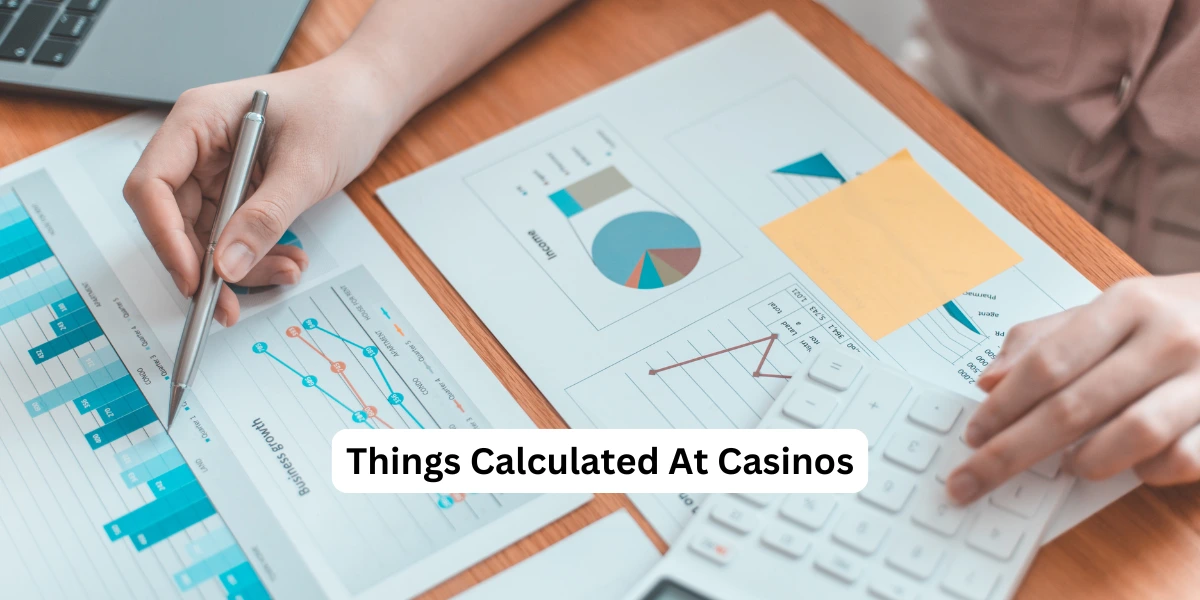
Things Calculated At Casinos
Introduction: Things Calculated At Casinos
When discussing Things Calculated At Casinos, it’s important to understand the various factors that casinos meticulously manage to ensure profitability while providing an enjoyable experience for players. These include key elements like the house edge, return to player (RTP) rates, and the odds of winning, all of which are carefully calculated to maintain a financial advantage. Casinos also track payout percentages, monitor volatility levels of games, and design loyalty programs that increase customer retention while balancing their earnings. Each of these metrics is crucial to the success of a casino operation.
Things Calculated At Casinos
Following is a list of things calculated at casinos:
- House Edge
- Return to Player (RTP)
- Odds of Winning
- Payback Percentages
- Comps and Promotional Programs
- Slot Cycle, or Slot Volatility
House Edge
A house edge is a fundamental concept in casino games that naturally carries an expectation of advantage through which the casino always gets ahead of the game; it ensures that no matter the occasional win or loss, the casino will always be a winner. The house edge is expressed as a percent value retained by the casino for each bet, and the remaining percent is theoretically returned to the players as winnings.
For instance:
- Black Jack: The house edge can be even less than 0.5%, depending on the rules and player strategy.
- Slot Machine: Generally, house edges are much higher, which can range from 5% to 15% or more, depending on the game.
- Roulette: American roulette has a house edge of approximately 5.26% whereas in European roulette, it is even lower at around 2.7%
Indeed, the house edge in each game calculated indicates the long-run profitability projected while offering competitive games to the gamblers.
Return To Player (RTP)
A return to player (RTP) percentage actually represents the amount of money from all the money put into a game that is speculated to be given back to players. It has emerged as one of the vital metrics to evaluate whether a game is balanced for the casino and the player in terms of profitability. For example, an RTP of 96% for a slot machine is equivalent to the average that casino players can get back from money stacked over time; the casino keeps the remaining 4% as its profit margin.
- Generally, the RTP for slots ranges between 85% and 98% and depends on the game and settings in the casino.
- Table Games such as blackjack may come with much higher RTPs, sometimes even over 99% with optimal strategy
- Video Poker games could also offer a pretty high return to player rate, usually from 97% to 99%
RTP is meant for the player to obtain clarity about the expected payout; however, it is calculated over millions of plays meaning that individual outcomes will vary a lot.
Odds of Winning
Odds in a casino game are the chances of a player winning a bet or attaining a certain outcome. Casinos work through careful calculations of these odds so that a large difference may be found between the types of games played.
- Slot Machines: Winning odds are relatively low for a slot. Especially on hitting the jackpot, this is often not probable. For instance, according to Investopedia, a chance of hitting the progressive grand jackpot maybe 1 in 34 million. However, hitting a small prize or winning in a single spin may have a high chance, sometimes 1 in 5 up to 1 in 100.
- Table Games: Winning odds of casino games depend on the strategy used by the players and the type of bet placed. On blackjack, for instance, winning a hand is about 42 percent, but with optimal strategy, the house edge is minimized to about 0.5%. For single number bets on roulette, there are odds of 1 in 37 if using European and 1 in 38 if American
- Poker: With games such as Texas Hold’em, the odds of a player’s win depends on the number of players against him and the hands they hold, but generally, odds will improve with better hole cards and strategic play.
These odds are integral to the design of casino games, ensuring a balance between player enjoyment and the casino’s profitability. Understanding the odds allows players to make more informed decisions about which games to play and how to place their bets.
Payback Percentages
Payback percentage is the amount in terms of winnings re-gained to the players while playing at a casino game over time, commonly given as a percentage of total wagers. It is one important percentage figure when considering the total profitability of the casino and player experience.
- Slots: The payback percentage for slot machines is usually between 85% and 98% relative to the game and casino. The higher RTP, the greater your chances are of getting it back in the long run. However, payback percentages for progressive slots may be relatively lower due to growing jackpot pools
- Video Poker: Video poker usually has a high payback percentage and usually, between 95% and 99%, although this might be dropped to single digits with games that would call for optimal strategy (e.g., full-pay Jacks or Better); without said optimal strategy, it lowers drastically
- Table Games: Table games like blackjack and roulette are also characterized by payback percentages, generally much higher than with slot machines, depending on the rules. Blackjack can have a payback percentage of 99% or better when played by an optimal strategy
This is a crucial number for both players and casinos since it determines expectations and also ensures that casinos maintain their profit margin over time while offering competitive, engaging games.
Comps of Promotional Packages
Comps and Promotional Packages in casinos are rewards or incentives given to players to encourage their loyalty and spending. Packages come in many different forms depending on casinos’ offers, or the activity of the player, or status within the casino’s loyalty program.
- Comps: Complimentary items or services, commonly known as comps, are usually issued based on the amount a player wagers or the time spent inside the casino. Examples of common comps include free meals, drinks, hotel rooms, and tickets to shows. The more a player wagers, the higher the value in comps can be earned. For example, a high roller may receive exclusive VIP comps, while a regular player can earn discounts or free play credits
- Promotional Packages: Many casinos provide promotional packages to newcomers, as well as loyal customers for special convenience. These deals can be welcome bonuses, matching deposits, or free spins on slot machines. Seasonal promotions, tournament invitations, or access to special events are also accepted ways that casinos can use to try to win players over. That is, such a package can increase a gambler’s time and money spent at the casino while giving him additional value.
Both comps and promotional packages are calculated based on the player’s activity and are an integral part of a casino’s marketing strategy to increase player retention and lifetime value.
Slot Cycle, or Slot Volatility
Slot Cycle or Slot Volatility can be defined as the frequency and size of payouts in a slot machine game, which results in determining player experience and casino profitability. Knowing the level of volatility helps players make informed decisions based on their own risk versus reward expectations.
- Low Volatility Slots: These are machines that tend to offer more frequent, smaller payouts. Steady wins can often be experienced, making low volatility slots appealing for players who prefer a more predictable experience with lower risk. For instance, slots such as Starburst have very low volatility
- High Volatility Slots: The slots have larger, less frequent payouts, meaning players might go for longer dry spells before hitting a big win. It is preferred by slot gamblers who enjoy the excitement of bigger jackpots but with a risk that sometimes they stand to lose much. Examples of high volatility slots include; Mega Moolah
Volatility is something the casino or game developer decides on to have more engagement between players and profitability. As an element in the entire gaming experience, it concludes to the point of how rewarding or risky the game seems to be for players.
Things Calculated At Casinos: Conclusion
In total, it is important for both players and casino operators to understand the different things calculated at casinos, such as house edge, RTP, payout percentages, and slot volatility. The metrics keep profitability balanced for the casino while simultaneously making sure players are engaged and having fun. Whether you are a casual player or a pro gambler, you’ll find these calculations guiding strategy, managing expectations, and providing an overall better gaming experience. You can even enjoy more frequent small wins or bigger, ricker payouts depending on what you are looking for.
Read Also: Vegas Matt: The Man Behind the Wealth and Fame
Frequently Asked Questions (FAQs)
Casinos include slot machines, blackjack and roulette tables, poker rooms, sports betting, and often, some forms of entertainment, such as shows and restaurants.
Revenue at casinos can be calculated by taking total bets minus total payouts considering house edge and odds for each game played.
Casinos use probability theory, statistics, and game theory to determine odds, house edge, payouts, and the expected value of bets.





